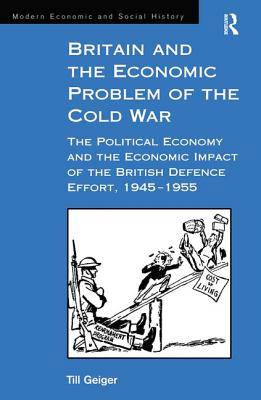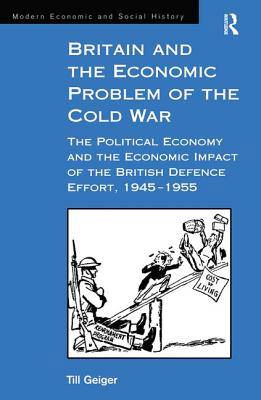
Door een staking bij bpost kan je online bestelling op dit moment iets langer onderweg zijn dan voorzien. Dringend iets nodig? Onze winkels ontvangen jou met open armen!
- Afhalen na 1 uur in een winkel met voorraad
- Gratis thuislevering in België vanaf € 30
- Ruim aanbod met 7 miljoen producten
Door een staking bij bpost kan je online bestelling op dit moment iets langer onderweg zijn dan voorzien. Dringend iets nodig? Onze winkels ontvangen jou met open armen!
- Afhalen na 1 uur in een winkel met voorraad
- Gratis thuislevering in België vanaf € 30
- Ruim aanbod met 7 miljoen producten
Zoeken
Britain and the Economic Problem of the Cold War
The Political Economy and the Economic Impact of the British Defence Effort, 1945-1955
Till Geiger
€ 195,95
+ 391 punten
Uitvoering
Omschrijving
Many accounts of British development since 1945 have attempted to discover why Britain experienced slower rates of economic growth than other Western European countries. In many cases, the explanation for this phenomenon has been attributed to the high level of defence spending that successive British post-war governments adhered to. Yet is it fair to assume that Britain's relative economic decline could have been prevented if policy makers had not spent so much on defence? Examining aspects of the political economy and economic impact of British defence expenditure in the period of the first cold war (1945-1955), this book challenges these widespread assumptions, looking in detail at the link between defence spending and economic decline. In contrast to earlier studies, Till Geiger not only analyses the British effort within the framework of Anglo-American relations, but also places it within the wider context of European integration. By reconsidering the previously accepted explanation of the economic impact of the British defence effort during the immediate post-war period, this book convincingly suggests that British foreign policy-makers retained a large defence budget to offset a sense of increased national vulnerability, brought about by a reduction in Britain's economic strength due to her war effort. Furthermore, it is shown that although this level of military spending may have slightly hampered post-war recovery, it was not in itself responsible for the decline of the British economy.
Specificaties
Betrokkenen
- Auteur(s):
- Uitgeverij:
Inhoud
- Aantal bladzijden:
- 372
- Taal:
- Engels
- Reeks:
Eigenschappen
- Productcode (EAN):
- 9780754602873
- Verschijningsdatum:
- 1/10/2004
- Uitvoering:
- Hardcover
- Formaat:
- Genaaid
- Afmetingen:
- 156 mm x 233 mm
- Gewicht:
- 692 g

Alleen bij Standaard Boekhandel
+ 391 punten op je klantenkaart van Standaard Boekhandel
Beoordelingen
We publiceren alleen reviews die voldoen aan de voorwaarden voor reviews. Bekijk onze voorwaarden voor reviews.











